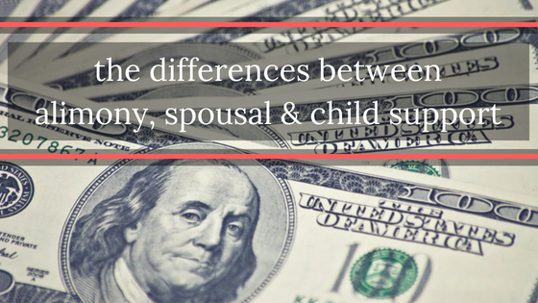After a divorce, there are different types of court-ordered payments that you may be responsible for. Alimony, child support, and spousal support are the three most common types of payment arrangements. In California, there are ways to avoid dealing with court orders and rather work together with written legal agreements for support payments as well. There are many laws, rules, and guidelines to follow, and it’s not always the easiest to navigate. We’re here to help our clients and friends understand the ins and outs of pre- and post-divorce financial obligations.
Alimony
Alimony is defined as a legal obligation of a person to financially support their spouse before, during, and after a separation or divorce. Alimony helps support the recipient spouse that can no longer afford to pay for their needs after the loss of their partner’s income support during any type of separation. Alimony is also deductible by the payor spouse, and the recipient spouse must include their alimony in their income.
Spousal Support
It might come as a surprise, but alimony and spousal support have the same definition in the state of California. Many people use the terms alimony and spousal support interchangeably. Alimony is an older version of the term, while spousal support is the newer, modern term used to help eliminate confusion between jurisdictions using different terms. Spousal support can also be court-ordered alongside a domestic violence restraining order. There are different types of spousal support that either spouse can receive in the state of California:
- Temporary Spousal Support: Sometimes, spousal support can be ordered to be paid while a divorce hearing is pending. This is a temporary solution until the permanent spousal support amount is defined and agreed upon by both parties or the court itself. The term permanent in permanent spousal support does not necessarily mean forever. It simply means that this is the final agreed-upon spousal support amount the payor spouse is responsible for after the proceedings have concluded.
- Permanent Spousal Support: Generally speaking, permanent spousal support tends to last no longer than half the length of the marriage if the marriage lasted less than 10 years. Of course, the longer the length of marriage typically means a longer length of permanent spousal support payouts. Once a marriage has hit the 10-year plus mark, there are many factors that can go into calculating spousal support. If you have questions regarding this complicated process or any of the determining factors of spousal support, we’re happy to help you with answers.
Child Support
Child support is pretty straightforward, it means the monthly payment that split-parents make to help cover the costs of raising a child. In California, the Court Commissioner or Family Law Judge has the final say on child support payment amounts. The state has an online child support calculator that can help give you an idea of what to potentially expect in your situation. Child support is often initiated as the state believes a child should share in the standard of living of both parents. Our state laws have a direct correlation between visitation time and child support. The theory is, a parent who spends more time with their child will have a greater need for child support.
Not only are court-ordered support payments decided within a divorce case, but so is community property, custody, marital settlements, separation agreements, and more. We’re here to help our clients with our in-depth understanding of the laws and various matters of court rulings. If you need counsel, we have years of collective experience and know what to expect in and out of the courtroom. Whether you and the other parent are able to come to an agreement or we need to present your case in front of a judge, our lawyers are ready to help.
For a free consultation, contact our Rancho Cucamonga divorce lawyers at (909) 726-7112.

